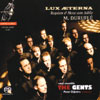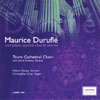Duruflé Requiem; Messe Cum Jubilo; Poulenc Sacred Choral Works
Differing approaches to this French choral music bring contrasting results
View record and artist detailsRecord and Artist Details
Composer or Director: Francis Poulenc, Olivier Messiaen, Maurice Duruflé
Genre:
Vocal
Label: Channel Classics
Magazine Review Date: 8/2005
Media Format: Super Audio CD
Media Runtime: 86
Mastering:
Stereo
DDD
Catalogue Number: CCSSA22405

Tracks:
| Composition | Artist Credit |
|---|---|
| Requiem |
Maurice Duruflé, Composer
Maurice Duruflé, Composer Peter Dijkstra, Conductor The Gents |
| Notre père |
Maurice Duruflé, Composer
Maurice Duruflé, Composer Peter Dijkstra, Conductor The Gents |
| (4) Petites prières de Saint François d'Assise |
Francis Poulenc, Composer
Francis Poulenc, Composer Peter Dijkstra, Conductor The Gents |
| Mass 'Cum jubilo' |
Maurice Duruflé, Composer
Maurice Duruflé, Composer Peter Dijkstra, Conductor The Gents |
| Laudes de Saint Antoine de Padoue |
Francis Poulenc, Composer
Francis Poulenc, Composer Peter Dijkstra, Conductor The Gents |
| O sacrum convivium! |
Olivier Messiaen, Composer
Olivier Messiaen, Composer Peter Dijkstra, Conductor The Gents |
Composer or Director: Maurice Duruflé
Genre:
Vocal
Label: Lammas
Magazine Review Date: 8/2005
Media Format: CD or Download
Media Runtime: 64
Mastering:
Stereo
DDD
Catalogue Number: LAMM174D

Tracks:
| Composition | Artist Credit |
|---|---|
| Requiem |
Maurice Duruflé, Composer
Christopher Gray, Organ Maurice Duruflé, Composer Robert Sharpe, Conductor Truro Cathedral Choir |
| (4) Motets sur des thèmes grégoriens |
Maurice Duruflé, Composer
Christopher Gray, Organ Maurice Duruflé, Composer Robert Sharpe, Conductor Truro Cathedral Choir |
| Mass 'Cum jubilo' |
Maurice Duruflé, Composer
Christopher Gray, Organ Maurice Duruflé, Composer Robert Sharpe, Conductor Truro Cathedral Choir |
| Notre père |
Maurice Duruflé, Composer
Christopher Gray, Organ Maurice Duruflé, Composer Robert Sharpe, Conductor Truro Cathedral Choir |
Author: rnichols
The original 1947 score uses a large orchestra, but the following year Duruflé made the reduced version with organ which is the one performed in both these recordings. As an organist and choirmaster Duruflé knew about writing for large enclosed spaces, even if his own Paris church of St-Etienne-du-Mont is not the largest or most resonant in the capital: harmonic movement is generally slow and the lines of the texture occupy well-defined vertical areas. Even so, and for all its plainsong elements, his choral music does not sing itself. The chief danger is that it subsides into an atmospheric mush, and the Truro Cathedral Choir do not altogether avoid this. No doubt the acoustic is largely responsible for many inaudible words, but there are several moments when a sharper attack and bolder phrasing would have helped. There are also too many late and rushed entries, most noticeably at the start of the Sanctus, where Duruflé, from experience, actually puts a stress mark over the initial quaver on the first syllable of that word. This is a pity because the boys especially make a lovely sound and are 99 per cent in tune.
Duruflé’s late Mass Cum jubilo is not in the same class as the Requiem: the plainsong melodies are unmemorable and there are few obvious moments when the spirit lifts. It’s a sober work and in this recording sobriety often descends into dullness – the baritone soloist’s high G sharp in the Gloria is startling, but for the wrong reasons. Here The Gents show what has to be done in the way of shaping phrases and using words. The acoustic of their church is far from dry, but it’s much easier to hear what’s going on. Partly this is because they are more closely recorded, but also because their diction is splendidly crisp and somehow they seem to be living the emotions behind the hallowed words – obviously an area where women always tend to score over choirboys.
The Gents, with or without distaff support, produce equally fine singing throughout their recording. Their tone is full but never hectoring or pompous, and the tricky passages of intonation in the Poulenc motets are managed with apparent ease, while their ensemble is a joy to listen to: the final ‘Amen’ of the Laudes sets a seal on the work in just the way Poulenc must surely have imagined. A finely controlled performance of Messiaen’s O sacrum convivium! ends this deeply impressive disc.
Discover the world's largest classical music catalogue with Presto Music.

Gramophone Digital Club
- Digital Edition
- Digital Archive
- Reviews Database
- Full website access
From £8.75 / month
Subscribe
Gramophone Full Club
- Print Edition
- Digital Edition
- Digital Archive
- Reviews Database
- Full website access
From £11.00 / month
Subscribe
If you are a library, university or other organisation that would be interested in an institutional subscription to Gramophone please click here for further information.




